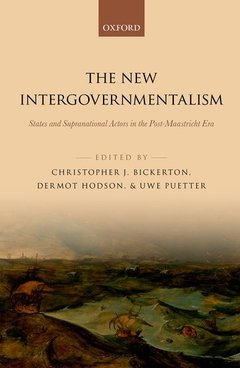The New Intergovernmentalism States and Supranational Actors in the Post-Maastricht Era
Langue : Anglais
Coordonnateurs : Bickerton Christopher J., Hodson Dermot, Puetter Uwe

The twenty years since the signing of the Maastricht Treaty have been marked by an integration paradox: although the scope of European Union (EU) activity has increased at an unprecedented pace, this increase has largely taken place in the absence of significant new transfers of power to supranational institutions along traditional lines. Conventional theories of European integration struggle to explain this paradox because they equate integration with the empowerment of specific supranational institutions under the traditional Community method. New governance scholars, meanwhile, have not filled this intellectual void, preferring instead to focus on specific deviations from the Community method rather than theorizing about the evolving nature of the European project. The New Intergovernmentalism challenges established assumptions about how member states behave, what supranational institutions want, and where the dividing line between high and low politics is located, and develops a new theoretical framework known as the new intergovernmentalism. The fifteen chapters in this volume by leading political scientists, political economists, and legal scholars explore the scope and limits of the new intergovernmentalism as a theory of post-Maastricht integration and draw conclusions about the profound state of political disequilibrium in which the EU operates. This book is of relevance to EU specialists seeking new ways of thinking about European integration and policy-making, and general readers who wish to understand what has happened to the EU in the two troubled decades since 1992.
Christopher Bickerton is University Lecturer, Department of Politics and International Studies, University of Cambridge, and a Fellow of Queen's College Cambridge. He has published widely on international politics and European integration and is the author of European Union Foreign Policy: From Effectiveness to Functionality (Palgrave, 2011) and European Integration: From Nation-States to Member States (Oxford University Press, 2012). Dermot Hodson is Reader in Political Economy, Birkbeck College, University of London. He has published extensively on European economic governance and is the author of Governing the Euro Area in Good Times and Bad (Oxford University Press, 2011). Uwe Puetter is Professor in Public Policy at the Central European University (CEU) in Budapest and Director of the CEU Center for European Union Research. He is a specialist in European Union governance and public policy and is the author of The Eurogroup (Manchester University Press, 2006), Die Wirtschafts- und Sozialpolitik der EU (UTB, 2009) and The European Council and the Council: New intergovernmentalism and institutional change (Oxford University Press, 2014).
Date de parution : 07-2015
Ouvrage de 400 p.
16.2x24 cm
Thèmes de The New Intergovernmentalism :
© 2024 LAVOISIER S.A.S.



